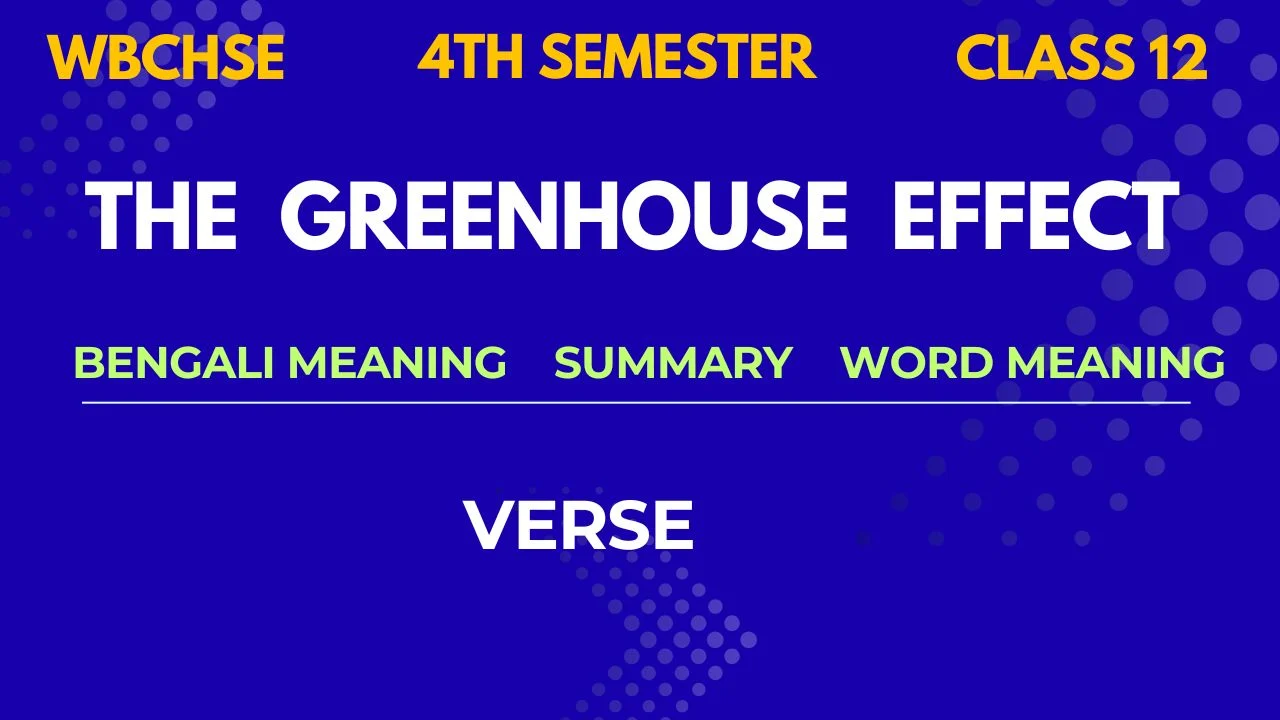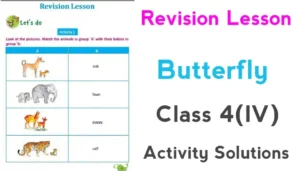Get The Greenhouse Effect Summary and Bengali Meaning WBCHSE for Class 12, 4th Semester students. Understand Carl Dennis’s poem on climate change, global warming, and human responsibility. Prepare effectively with a simple English summary and Bengali explanation for WBCHSE exams.
About the Poet:
Carl Dennis (born September 17, 1939) in St. Louis, Missouri, is an acclaimed American poet. His poetry is known for its quiet intelligence, thoughtful reflection, and honest depiction of the life and struggles of the American middle class. Dennis has a unique ability to shape everyday speech into smooth, “casually regular” pentameter lines. Apart from poetry, he has written a book of literary criticism, Poetry as Persuasion (2001). In this work, Dennis explores the relationship between the reader and the writer, showing how a poem’s voice can be created using techniques like irony, mock-heroic style, and myth. He emphasizes that poetry is a form of communication that depends on compelling speakers, supported by careful readings of many poets and poems.
| Short Type and Long Type Questions Answers: The Greenhouse Effect |
Summary:
The poem “The Greenhouse Effect” shows how careless human actions harm the environment. The poet explains how pollution and industrial growth trap heat in the atmosphere, causing climate change. This change brings floods, droughts, and extreme weather that disturb both nature and human life. The poem also warns that greed and the overuse of resources destroy forests, animals, and the balance in nature. The poet makes us think about how future generations will suffer if people continue to ignore the warning signs. He asks us to live in harmony with nature and reduce waste, greed, and selfishness. The message is clear: saving the earth is not only a duty but also a responsibility of every human being. The poem is simple but powerful. It teaches us to respect nature.
(কবিতা “The Greenhouse Effect” দেখায় কীভাবে মানুষের অসচেতন কাজকর্ম পরিবেশকে ক্ষতি করে। কবি বোঝান কীভাবে দূষণ ও শিল্পের বৃদ্ধি বায়ুমণ্ডলে তাপ আটকে রাখে, যার ফলে জলবায়ু পরিবর্তন ঘটে। এই পরিবর্তন বন্যা, খরা ও চরম আবহাওয়া নিয়ে আসে যা প্রকৃতি ও মানুষের জীবনকে ব্যাহত করে। কবিতা আরও সতর্ক করে যে লোভ ও সম্পদের অপব্যবহার বন, প্রাণী এবং প্রকৃতির ভারসাম্য নষ্ট করছে। কবি আমাদের ভাবতে বাধ্য করেন—ভবিষ্যৎ প্রজন্ম ভুগবে যদি মানুষ সতর্ক সংকেতকে উপেক্ষা করে। তিনি অনুরোধ করেন প্রকৃতির সাথে মিল রেখে চলতে এবং অপচয়, লোভ ও স্বার্থপরতা কমাতে। বার্তাটি স্পষ্ট—পৃথিবীকে রক্ষা করা শুধু কর্তব্য নয়, প্রতিটি মানুষের দায়িত্ব। কবিতাটি সহজ কিন্তু শক্তিশালী। এটি আমাদের প্রকৃতিকে সম্মান করতে শেখায়।)
Appropriateness of the Title:
The title “The Greenhouse Effect” is very appropriate for the poem. The poet discusses how human activities like pollution, deforestation, and industrial growth trap heat in the atmosphere, causing global warming. This warming affects nature and human life, leading to droughts, floods, and loss of fertile land. The poem shows that humans are unaware or careless about the long-term effects of climate change. The “greenhouse effect” refers to the way the Earth’s atmosphere traps heat, which is the central theme of the poem. By using this title, Carl Dennis clearly signals the environmental warning, making readers think about their role in protecting the planet. It perfectly captures the main message of danger and responsibility.
(কবিতার শিরোনাম “দ্য গ্রীনহাউস ইফেক্ট” খুবই প্রাসঙ্গিক। কবি দেখিয়েছেন কীভাবে মানুষের কর্মকাণ্ড যেমন দূষণ, বন ধ্বংস, এবং শিল্পায়ন বায়ুমণ্ডলে তাপ আটকে রাখে, যার ফলে বৈশ্বিক উষ্ণায়ন হয়। এই উষ্ণতা প্রকৃতি ও মানুষের জীবনকে প্রভাবিত করে, যেমন খরা, বন্যা, এবং উর্বর জমির ক্ষয়। কবিতা দেখায় মানুষ দীর্ঘমেয়াদী ফলাফল সম্পর্কে সচেতন নয় বা অবহেলা করে। “Greenhouse effect” বলতে পৃথিবীর বায়ুমণ্ডল তাপ ধরে রাখার প্রক্রিয়াকে বোঝায়, যা কবিতার মূল বিষয়। এই শিরোনাম ব্যবহার করে কার্ল ডেনিস পাঠকদের সতর্ক করে, তাদেরকে পৃথিবী রক্ষায় দায়িত্বশীল হতে ভাবায়। এটি কবিতার মূল বার্তা—পরিবেশ বিপদের সতর্কবার্তা ও মানব দায়িত্ব—কে পুরোপুরি তুলে ধরে।)
Central Idea and Critical Appreciation:
The central idea of Carl Dennis’s poem “The Greenhouse Effect” is to warn humanity about the harmful effects of climate change caused by human carelessness. The poem describes a future where fertile lands are lost, cities are overcrowded, and people struggle due to poverty. Dennis uses vivid imagery of dust bowls, failing public buildings, and grazing sheep to show the environmental and social consequences. He also highlights how powerful nations will take advantage while weaker nations suffer. The poem is simple in language but deep in meaning. It combines realism with irony, showing how humans ignore the warnings of nature. Through this poem, Dennis urges readers to recognize their responsibility, adopt sustainable habits, and protect the environment for future generations. The poem is both a warning and a call for action. Its imagery is vivid and thought-provoking.
(কার্ল ডেনিসের কবিতা “দ্য গ্রীনহাউস ইফেক্ট” মূলত মানুষকে সতর্ক করে দেয় মানব কর্মকাণ্ডের কারণে জলবায়ু পরিবর্তনের ক্ষতিকর প্রভাব সম্পর্কে। কবিতা এমন একটি ভবিষ্যতের চিত্র দেখায় যেখানে উর্বর জমি হারাবে, শহরগুলো ভিড়ভাড়াক্রান্ত হবে, এবং মানুষ দারিদ্র্যের কারণে কষ্ট পাবে। ডেনিস ধূলিঝড়ের মাঠ, সরকারি ভবনের ক্ষয়, এবং চত্বরে ভেড়া চরা—এই চিত্রগুলোর মাধ্যমে পরিবেশ ও সামাজিক সমস্যার গভীরতা দেখান। তিনি আরও দেখান কীভাবে শক্তিশালী দেশগুলো সুযোগ নেবে এবং দুর্বল দেশগুলো ভোগাবে। ভাষা সহজ হলেও ভাবনা গভীর। কবিতায় বাস্তবতা ও ব্যঙ্গ মিশে আছে, যা মানুষের অবহেলা বোঝায়। ডেনিস পাঠকদের অনুরোধ করেন দায়িত্ব সচেতন হবার, টেকসই অভ্যাস গ্রহণ করার, এবং ভবিষ্যৎ প্রজন্মের জন্য পরিবেশ রক্ষার। কবিতাটি সতর্কবার্তা এবং কর্মের আহ্বান উভয়। চিত্রায়ন বাস্তবসম্মত ও চিন্তাপ্রবণ।)
The Greenhouse Effect Line by Line Bengali Meaning:
1. The gradual warming trend will likely go on
পৃথিবীর তাপমাত্রা ধীরে ধীরে বাড়তেই থাকবে।
2. And the grain belts’ begin to slide closer to the poles.
শস্য উৎপাদনের অঞ্চলগুলো মেরুর দিকে সরে যাবে।
3. The Plains States will be abandoned as giant dust bowls.
প্লেইনস অঞ্চলের রাজ্যগুলো মানুষ ছেড়ে চলে যাবে এবং সেগুলো বিশাল ধূলিমাখা মরুভূমির মতো হয়ে যাবে।
4. Greenland and Antarctica will join the new Great Powers.
গ্রিনল্যান্ড আর অ্যান্টার্কটিকা ভবিষ্যতে নতুন শক্তিধর অঞ্চলের কাতারে উঠে আসবে।
5. Even if we play them off against each other
যদিও আমরা তাদের একে অপরের বিরুদ্ধে লাগাই,
6. For more aid, we’ll still be poorer than we are now.
সাহায্য পেলেও আমরা এখনকার থেকেও গরিব হয়ে যাব।
7. Life will be different, good tillable land so dear
জীবন বদলে যাবে, আবাদযোগ্য জমি হবে খুবই দুষ্প্রাপ্য।
8. The suburbs will give way to farms, the cities
শহরতলির জায়গা হবে চাষের জমি, আর শহরগুলো
9. Fill up again with people too poor to own cars”.
আবার ভরে উঠবে এমন মানুষে যারা গাড়ি কেনার সামর্থ্য রাখে না।
10. Walking to work or crowding on trollies,
পায়ে হেঁটে কাজে যাবো বা ট্রলি-বাসে ভিড় করে চলবো।
11. We’ll move down streets lined with practical nut trees,
আমরা হাঁটব এমন রাস্তায়, যার পাশে থাকবে ফলদানকারী গাছ।
12. Not elms and oaks, with vegetables crowding the front lawns.
সেখানে এলম বা ওক গাছ থাকবে না, বাড়ির উঠোনে থাকবে সবজি গাছ।
13. The tax base will be too small to support the public buildings.
করের টাকা এত কম হবে যে সরকারি ভবন চালানো যাবে না।
14. We’ll have to donate hours after work each week
আমাদের প্রতি সপ্তাহে কাজের পর সময় দিতে হবে।
15. To rake the lawn of the Library and City Hall,
লাইব্রেরি আর সিটি হলের লন পরিষ্কার করার জন্য।
16. To tuckpoint the chimney of the Federal Building
ফেডারেল ভবনের চিমনির ইটের ফাঁকগুলো ভরে সিল করে মেরামত করা।
17. If we don’t want the place to fall like temples in Rome’,
যদি না চাই এগুলো রোমের মন্দিরের মতো ভেঙে পড়ুক,
18. Don’t want sheep to graze in our squares
না চাই আমাদের মাঠে ভেড়া চরুক,
19. As they grazed in the Forum for a thousand years.
যেমন রোমান ফোরামে বহু বছর ধরে ভেড়া চরেছে।
20. With a little effort the country will go on.
সামান্য চেষ্টা করলে দেশ চলতে থাকবে।
21. So what if we’ve lost our high place to stronger Carthages
শক্তিশালী অন্য দেশের কাছে শ্রেষ্ঠত্ব হারালেই বা কী,
22. Whose far-flung fleets will be loaded with merchandise
যাদের নৌবহর ভরে যাবে নানা পণ্যে,
23. Cheaper than ours. We’ll be glad to watch from the beach
যা আমাদের চেয়ে সস্তা হবে। আমরা সৈকত থেকে দেখে খুশি হব।
24. As the lights from Korean armadas pass
যখন কোরিয়ার যুদ্ধজাহাজের আলো আমাদের সামনে দিয়ে যাবে,
25. On their endless patrols around the world.
পৃথিবীজুড়ে তাদের টহলদারিতে।
26. Let them have their little time in the sun,
ওদেরকে কিছুদিন দাপট দেখাতে দাও,
27. We’ll say to ourselves as we begin to sway
আমরা নিজেদের বলব, যখন দুলতে শুরু করব
28. To the strains of our native beach band,
আমাদের সমুদ্রতীরের ব্যান্ডের সুরে,
29. Ignoring the hits from the Arctic on the radio.
রেডিওতে বাজতে থাকা আর্কটিকের খবর উপেক্ষা করে।
Important Words and Phrases:
Gradual warming trend – Slow rise in temperature : ধীরে ধীরে উষ্ণতা বৃদ্ধি
Grain belts – Agricultural regions : শস্য উৎপাদনের অঞ্চল
Dust bowls – Barren land due to drought : খরায় বিরানভূমি
Great Powers – Strong nations : মহাশক্তিধর দেশ
Tillable land – Land fit for farming : আবাদযোগ্য জমি
Suburbs – Outskirts of a city : শহরতলি
Public buildings – Government buildings : সরকারি ভবন
City Hall – Town administrative building : নগর প্রশাসনিক ভবন
Forum (Rome) – Central square in ancient Rome : প্রাচীন রোমের কেন্দ্রীয় চত্বর
Carthages – Powerful rival nations : শক্তিশালী প্রতিদ্বন্দ্বী দেশ
Armadas – Large fleets of warships : বিশাল যুদ্ধজাহাজ বহর
Patrols – Regular military watching : সামরিক টহল
Strains of band – Musical tunes : সঙ্গীতের সুর
Ignoring the hits – Avoiding dangers : বিপদ উপেক্ষা করা
Slow rise in temperature: ধীরে ধীরে উষ্ণতা বৃদ্ধি
Grain belts: Agricultural regions: শস্য উৎপাদনের অঞ্চল
Dust bowls: Barren land due to drought: খরায় বিরানভূমি
Great Powers: Strong nations: মহাশক্তিধর দেশ
Tillable land: Land fit for farming: আবাদযোগ্য জমি
Suburbs: Outskirts of a city: শহরতলি
Walking to work: Going to work by foot: পায়ে হেঁটে কাজে যাওয়া
Trollies: Public transport vehicles: ট্রলি বা গণপরিবহন
Nut trees: Trees that produce edible nuts: ফলদানকারী গাছ
Vegetables crowding lawns: Vegetables growing densely on front yards: উঠোনে সবজি ঘনভাবে জন্মানো
Public buildings: Government buildings: সরকারি ভবন
Donate hours after work: Give voluntary time: নিজের সময় দান করা
City Hall: Town administrative building: নগর প্রশাসনিক ভবন
Tuckpoint the chimney: Repair gaps in chimney bricks: চিমনির ইটের ফাঁক মেরামত করা
Temples in Rome: Old buildings that fell down: রোমের মন্দিরের মতো ভেঙে পড়া পুরনো ভবন
Sheep grazing in squares: Sheep eating grass in public places: চত্বরে ভেড়া চরা
Forum (Rome): Central square in ancient Rome: প্রাচীন রোমের কেন্দ্রীয় চত্বর
Carthages: Powerful rival nations: শক্তিশালী প্রতিদ্বন্দ্বী দেশ
Armadas: Large fleets of warships: বিশাল যুদ্ধজাহাজ বহর
Patrols: Regular military watching: সামরিক টহল
Strains of band: Musical tunes: সঙ্গীতের সুর
Ignoring the hits: Avoiding dangers: বিপদ উপেক্ষা করা
Merchandise: Goods or products: পণ্যসামগ্রী
Poorest people: Very poor people: সবচেয়ে দরিদ্র মানুষ
Future generations: People who will live later: ভবিষ্যৎ প্রজন্ম







